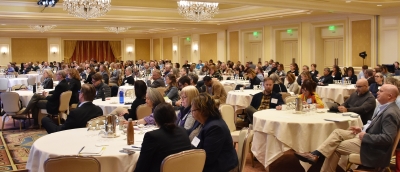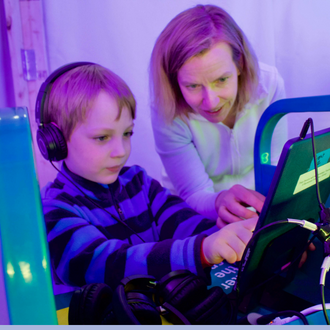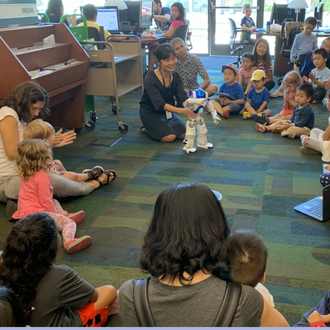2019 ULC Forum Recap

"The future is already here, it is just not evenly distributed."
William Gibson
Artificial intelligence is no longer the stuff of science fiction. AI-powered technologies have rapidly been woven into the fabric of people's daily lives in the form of personal assistants like Siri and Alexa. AI has led to the automation of jobs, the proliferation of misinformation and "fake news" agents, augmented opportunities for personalized learning and more. This technological wave has only just begun — it continues to transform our economies, societies and cultures, with communities relying on public libraries to protect and advance equitable opportunities and democratic values.
On October 16-18, the 2019 ULC Forum: Preparing to Lead on AI + Digital Citizenship convened North American library leaders in Salt Lake City for a deep dive into the needs and opportunities for library leadership in the AI age. Attendees engaged in dynamic education sessions, learning activities, peer discussions and workshops to demystify AI issues and define actionable ways that libraries can help foster responsible, empowered digital citizens as the impact of AI grows. Jeffrey Cufaude (President and CEO, Idea Architects) served as the Forum's facilitator, helping participants synthesize discussions and build connections through interactive learning activities.
Below are key highlights from these pivotal conversations and activities. Use the #ULCForum2019 hashtag on social media to explore additional event highlights and share your own favorite moments!
Education Sessions (Oct. 17-18)

Susan Benton, Kelvin Watson, Lisa Rosenblum, Danielle McDonald and David Leonard take on Setting the Stage for Libraries in the AI Age
Setting the Stage for Libraries in the AI Age
The 2019 Forum's opening session featured a dynamic conversation between leaders of library systems that are actively taking on AI issues in their communities through innovative programs and resource development. Panelists for the session included David Leonard (President, Boston Public Library), Lisa Rosenblum (Executive Director, King County Library System), Kelvin Watson (Director, Broward County Library) and Danielle McDonald (CEO, Ottawa Public Library). ULC President & CEO Susan Benton moderated this panel discussion, which focused on:
- The rising importance of "algorithmic literacy" for 21st-century citizens.
- The powerful potential for AI to change the workforce and our economy, leading to new career paths and education needs.
- Opportunities for communities to benefit greatly from AI tools if they are able to address key challenges to privacy, data ownership and information access presented by AI technology.

Jim Cooper, Salt Lake City Mayor Jackie Biskupski, Peter Bromberg and Susan Benton
Welcome Address by Salt Lake City Mayor Jackie Biskupski
Following the Forum's opening panel, Jim Cooper (Director, Salt Lake County Library) and Peter Bromberg (Executive Director, Salt Lake City Public Library) welcomed attendees to the Forum and introduced Salt Lake City Mayor Jackie Biskupski, who shared her strong belief in the enduring importance of libraries to leading communities forward. Mayor Biskupski noted that cities have always been places of knowledge and as they continue to grow, it is critical to invest in libraries, especially as polarizing issues such as climate change and systemic inequity continue to challenge the future of our communities. Mayor Biskupski expressed her confidence in libraries as leaders in the AI age due to their fundamental capacity as social laboratories that adapt quickly to change and foster innovation.

Peter Bromberg, Shauna Edson, Nole Walkingshaw and Karen Rodriguez discuss Building Digital Equity and Citizenship in Salt Lake
Building Digital Equity and Citizenship in Salt Lake
The regional library systems and other community leaders in the Salt Lake area have formed a robust alliance, Utah Communities Connect, to advance digital inclusion outcomes throughout the state. During a session focused on digital equity and citizenship, attendees learned insights from the successes of Utah Communities Connect and other local digital inclusion partnerships from a panel that included: Peter Bromberg (as moderator), Shauna Edson (Digital Inclusion Coordinator, Salt Lake City Public Library; Chair, Utah Communities Connect), Nole Walkingshaw (Deputy Director, Administrative Services, Salt Lake City Public Services) and Karen Rodriguez (Founder and CEO, Code in Color).
Panelists shared how Utah Communities Connect has focused on the importance of public and private partnerships to promote equity and digital inclusion. Challenges they are working to address include:
- Onramps to tech jobs for communities with limited access to college and education.
- Establishing guiding principles for a digitally inclusive city.
- Forming public and private partnerships to foster talent development.
- Helping people understand that tech is accessible for everyone.
The panelists challenged library leaders to consider:
- Conducting a needs assessment and advocating for funding, as well as showing the impact of the library.
- Building wide partnerships across many organizations, like the housing authority, nonprofits and corporations.
- Rewriting entry level jobs on a skills basis and broadening the scope of who can apply to them.

Jake Dunagan addresses Forum attendees during the Ethical OS Workshop
Leading Your Community Forward as Digital Citizens: Ethical OS Workshop
The Institute for the Future is the world’s leading futures thinking organization and for over 50 years businesses, governments and social impact organizations have depended upon IFTF resources and training to navigate complex change. For the 2019 ULC Forum's Keynote Workshop, IFTF's Jake Dunagan (Director, Governance Futures Lab) and Lane Becker (Research Associate, Governance Futures Lab) engaged with attendees to establish a common language and toolset for libraries to explore challenges/risks posed by emerging technologies and the communities libraries serve.
During the workshop, Jake and Lane emphasized that long term thinking is hard and people often struggle to plan for desired futures. They invited attendees to consider the future as a range of potential scenarios instead of a single possibility. Jake and Lane shared that when it comes to AI, "the future is already here, it is just not evenly distributed," reiterating William Gibson's quote. Libraries can help overcome inequity in the AI age by helping people navigate change, influencing the social narrative of AI and educating communities on the realities and opportunities of emerging tech.
Building off the framework of IFTF's Ethical OS Toolkit, Jake and Lane encouraged Forum participants to ask themselves:
- What is the risk that technology can be used to undermine the truth and spread disinformation?
- In a world without privacy, what is the importance of critical thinking?
- How can false narratives and "deep fakes" result in community destabilization and how can we prepare to address those issues?
- How might technology be used to decrease inequity?
ULC thanks Baker & Taylor for sponsoring this session.

Shari Henry and Michael Hibben present during the Leading in AI and Digital Citizenship education session
Leading in AI and Digital Citizenship
This discussion featured two TED-style talks outlining how ULC member libraries are innovating to serve as community leaders for AI.
Cambridge Public Library's Reinhard Engels (Manager of Innovation and Technology) profiled how the library is utilizing an interactive art installation to educate community members about AI. For example, the library's “Laughing Room” installation invited library visitors onto a sitcom set, where a computer algorithm analyzed conversations in real time and played a laugh track when participants made jokes. The Laughing Room helped open eyes to the extensive surveillance concerns and wide applications of AI. Reinhard stressed that everyone deserves to interact with the technology and science that is affecting us, and the library plays an important role in making that possible.
Read this ULC blog entry to learn more about CPL's work with AI.
The second presentation featured Roanoke County Public Library's Shari Henry (Director) and Michael Hibben (Senior Branch Manager). Shari and Michael shared that the library's work with AI grew out of its focus on making sure the people in Roanoke understand emerging technology. RCPL identified the need to prepare, recruit and retain talent to support local economic development, leaning into the challenge by driving an initiative focused on the tech revolution and preparing the future workforce. The library received national attention for their work in the AI space after introducing Pepper®, the humanoid robot to patrons. Pepper® helped the library deepen its engagement with community members around the concepts of AI and robotics, and RCPL has since expanded its AI resources and programming to include additional reports, workshops, enhanced makerspace resources and a partnership with Girls Who Code.
Read this ULC blog entry to learn more about RCPL's work with AI.

Paula Brehm-Heeger, Mark Asberg, Dr. Mary J. Wardell-Ghirarduzzi and Roosevelt Weeks discuss Leadership – Equity in the AI Age
Leadership – Equity in the AI Age
Led by Dr. Mary J. Wardell-Ghirarduzzi (Vice Provost and Chief Diversity Officer, University of San Francisco; President, San Francisco Public Library Commission), this panel engaged library leaders in a discussion of how libraries can anticipate and actively work to address challenges to race and social equity related to AI. Panelists included: Mark Asberg (CEO, Calgary Public Library), Paula Brehm-Heeger (Eva Jane Romaine Coombe Library Director, The Public Library of Cincinnati and Hamilton County) and Roosevelt Weeks (Director of Libraries, Austin Public Library).
All panelists agreed that libraries have an opportunity and responsibility to influence a more equitable and fair future for AI in our communities. The panelists emphasized that corporations are driving the development of AI, and those corporations prioritize reducing labor costs to increase profits. Those who will be impacted the most by AI do not have a seat at the table when it comes to AI's growth and applications. The panelists shared the following recommendations for ways that libraries can serve as champions for equity as AI becomes more prevalent:
- Determine equity gaps that already exist in your library’s current use of AI tools (e.g., for hiring practices, security/surveillance and privacy safeguards).
- Help staff recognize and address their biases through learning and training opportunities.
- Focus the library's strategic efforts on reaching the disenfranchised, creating and maintaining a welcoming environment, being forthright on tough issues and fostering race and social equity.
- Be proactive in talking with local government leaders about equity and AI.
- Build credibility with stakeholders by communicating the library's commitment and successes with AI leadership.
Social Events

Attendees celebrate at the 2019 ULC Forum Welcome Reception
Welcome Reception (Oct. 16)
Forum attendees gathered on October 16 to kick off the Forum with a reception hosted on the rooftop of the Salt Lake City Public Library's Main Library. The event included welcoming remarks by Jim Cooper (Director, Salt Lake County Library) and Peter Bromberg (Executive Director, Salt Lake City Public Library).

Attendees let loose at the 2019 ULC Forum Innovations Celebration
Innovations Celebration (Oct. 17)
Salt Lake County Library's Viridian Event Center transformed into a tropical retreat for the 2019 ULC Innovations Celebration, held on October 17. During this unique event, Forum attendees enjoyed festive food and drink, had caricatures drawn by a professional artist and celebrated the award winners for the 2019 ULC Innovations Initiative. For the first time ever, event attendees also selected Audience Choice award winners by voting on entries live during the Innovations Celebration. Congratulations to Gwinnett County Public Library and Dayton Metro Library for winning Audience Choice Top Innovator and Honorable Mention, respectively.
Click here to learn more about the Top Innovator and Honorable Mention award winners, and click here to learn more about all 260 entries this year's Innovations Initiative.
ULC thanks Ingram for sponsoring this session.
Photo Gallery
Learning Resources
Leadership Brief: Libraries Leading AI and Digital Citizenship
Read NowWhile AI promises to enhance our communities in remarkable ways, it also poses significant threats to the prosperity, privacy and security of individuals who do not understand or cannot access these new technologies. This Leadership Brief provides targeted strategies for North America's public libraries to ensure an equitable and inclusive future in the Age of AI.
ULC Blog Entries on AI
Read these ULC blog entries to learn more about the innovative ways that libraries are taking on AI issues:
- Local Voices Network: Using AI to Elevate Community Voices and Inform Library Planning
- Enhancing Customer Service Using Artificial Intelligence
- Lessons from the "Robo Dojo Master": Robotics and AI in Libraries
- Artificial Intelligence in Public Libraries: Our Civic Mission
- Breaking Open Artificial Intelligence for the Masses
- Leading Digital Inclusion in Salt Lake City: Interview with SLCPL's Peter Bromberg
- Salt Lake County Library Is Leading Its Community Forward in the Digital Age
- Whatcha Gonna Do When They Come for You? Libraries, Robots and AI
ULC Webinar Recordings
ULC members can access these recorded webinar sessions about library leadership in AI:
Related Articles

Artificial Intelligence in Public Libraries: Our Civic Mission
Cambridge Public Library
Learn how Cambridge Public Library is innovating to engage community members in conversations about the social, economic and democratic implications of AI.
Learn More

Lessons from the "Robo Dojo Master": Robotics and AI in Libraries
Palo Alto City Library
Palo Alto City Library's Dan Lou provides an overview of the library's efforts to lead robotics and AI education in order to help the community understand cutting-edge technologies and better prepare for an uncertain future.




